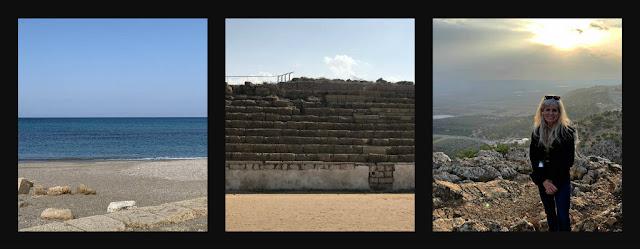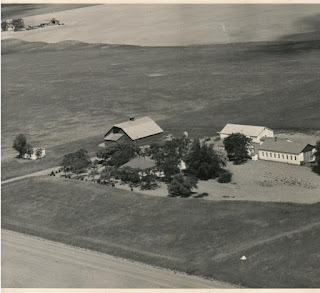Trip of a Lifetime? Indeed
Dawn on the Mediterranean Sea—even in November was warm. King Herod built a palace along its shores—complete with a hippodrome for his entertainment. Chariot races were popular and spectators perched on the rock benches. Onlookers also relished the gruesome man versus beast contests.
The old stones left me imagining what must have been, but things came into focus at Caesarea Philippi. I peered into a deep cavern along the stone cliffside, where hot fires once burned deep below. Children were tossed into the flames to appease the gods. It was here that Jesus brought his disciples and asked, “Who do people say that I am?” In a pagan culture that misunderstood God, it was THE question to ask. It’s still asked today.
Caesarea Philippi is close enough to Lebanon that the road getting there features miles of high barbed wire fences and frequent warnings signs about scattered landmines from the earlier war. A deadly reminder that peace is not assured here on earth.
Cavern for sacrifices Niche for idols Danger: Land Mines
Jerusalem is the confluence of three of the world’s main religions. The mixture of cultures and beliefs is striking, but well-guarded grounds keep tourists safe. Old city walls bear the bullet-pocked scars of Israel’s 1948 War of Independence. It’s the intersection of modern and antiquity, of war and peace.
Pool of Bethesda Bullet-marked walls Old City
Jews and Christians converge at the last remaining vestige of the rebuilt Temple—the Western Wall. Now it serves as a place for prayer—men to one side, women on the other. We placed slips of papers with our prayers in the wall’s cracks. Twice a year the paper petitions are gathered and buried on the Mount of Olives.
Israel Museum replica of ancient Jerusalem First Century Jerusalem street
To follow the steps Christ took on the way to his crucifixion we walked through the Old City’s Muslim Quarter. Fresh vegetables and hot spicy food were cooked on open grills tantalized the senses. Merchants chanted prices for their wares. I wondered what the shop keepers were doing on the day Christ struggled past?
Muslim Quarter in the Old City of Jerusalem
After walking through the memorial for the Jewish children, I could barely stand. It began to drizzle—then I walked in the rain and my tears flowed freely.
The words of the prophet Joel were carved into an entrance pillar. Let us keep telling the next generation, lest they forget. I will.
We crossed the border from Israel’s freedom to the oppression that comes from Jordan’s police state. Our Jordanian guide warned the women that it was a Muslim nation—men could have four wives. If they wanted another, they just had to get rid of one. He advised us to be wary.
He explained that the country now had a majority of Syrian refugees—they committed most of the crimes. He said Jordan’s prisons are places of hard labor, and then lowering his voice said, “and worse.” An armed policeman escorted us everywhere:
We drove up the curvy road to Mt. Nebo, where Moses viewed the Promised Land—yet current residents have no such promise.
We drove up the curvy road to Mt. Nebo, where Moses viewed the Promised Land—yet current residents have no such promise.
Poverty is entrenched in Jordan. It’s a gritty poor, with little boys selling cheap Chinese trinkets for a dollar. America’s poor are blessed in comparison. Yet, in a land with no freedom of speech or religion, I loved a shop-keeper’s window message: We In God Trus.
Petra—an ancient city carved into the sandstone walls took a four hour drive on the King’s Highway—a bumpy, curvy, and arguably a dangerous road. We then walked along a narrow passage with steep cliffs on both sides. Horse and buggies with determined drivers yelled warnings as they galloped past. We clung to the sides—watching passengers bounce mercilessly in the carriages. Our first glimpse of the famous Treasury made the trip worth it.
Petra
With miles of walking over ancient roads, and more languages than I’ve ever heard at once, I boarded my flight to leave the Holy Land—but the Holy Land can never be taken from me.













